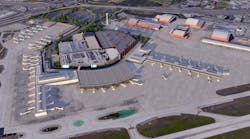… it appears the good folks on Capitol Hill may be ready to actually pass a long-term (two years) FAA reauthorization bill. This week the U.S. Senate passed the FAA Air Transportation Modernization and Safety Improvement Act (S.1451). Just prior to that, the U.S. House passed H.R. 4851, a continuing resolution which would extend FAA authorization through July 3, 2010. Apparently, the House wasn’t too confident in the Senate’s ability to get the job done.
But we’re there, with a conference committee set to take up some of the disagreements that remain between the House and Senate bills. Among the issues that remain are a labor provision that would allow FedEx workers to unionize; increased aircraft rescue and firefighting requirements; inspections of foreign repair stations; and whether or not to raise the cap on passenger facility charges (PFCs) – which the House supports but the Senate doesn’t.
General aviation groups are satisfied that neither bill calls for new user fees on the industry, but instead raises the fuel tax from 22 cents to 36 cents per gallon. Comments NBAA president Ed Bolen, “Importantly, the legislation builds on the fuel tax to help pay for modernization, instead of resorting to user fees. This approach is the one uniformly supported by general aviation to help pay for ‘Next Gen’.” Adds NATA president Jim Coyne, “I would like to congratulate the U.S. Senate for approving a two-year FAA reauthorization bill that is void of user fees and that provides a fair jet fuel tax increase.”
One provision of the Senate bill could have a significant ripple effect throughout the commercial aviation community – it calls for air carrier pilots to have logged at least 1,500 hours before flying commercial airliners. It also calls on FAA to revise flight and duty time regs and to issue a final rule within one year. I’ve been in this business since 1984 and flight and duty time seems to be an issue that is forever on FAA’s agenda. Either way, it will be interesting to watch what impact the increased flight time requirements will have on the industry, at a time when aviation is competing with high-tech industries for new entrants.
Then there are PFCs and the proposed increase. Airport groups want the PFC cap boosted to $7.50 and indexed for inflation. The best they’ll get comes from the House bill, which raises the cap to $7. Airlines publicly deplore the PFC and continually charge that they lose passengers because of the tax (fee). In fact, they are one of the greatest beneficiaries of PFCs, with improved facilities for their customers. Comments AAAE president Chip Barclay, “"The inability of Congress to reach agreement on a long-term FAA bill for an extended period has come at a heavy price in terms of lost federal resources for the Airport Improvement Program and foregone revenue that an increased PFC could create.”
Perhaps the best news for airports is that the Senate bill would provide some $8 billion for the Airport Improvement Program over two years. Comments ACI-NA president Greg Principato, “We are pleased that Congress is breaking out of its cycle of three months extensions that have been ongoing since 2007. We look forward to the House and Senate resolving their differences and hope that a final bill will be passed quickly.”
Put the emphasis on ‘quickly’.
Thanks for reading. jfi



